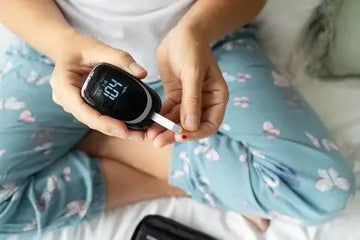Introduction:
Hot flashes are a common symptom experienced by nearly 80% of individuals going through natural menopause, with approximately 30% reporting frequent or severe occurrences. These vasomotor episodes, characterized by sudden heat, flushing, and sweating, have been linked to ovarian changes in early menopause that result in fluctuating estrogen levels. While the exact role of glucose in triggering hot flashes is not fully understood, research indicates a significant link between metabolic conditions like insulin resistance, diabetes, and the severity of menopausal symptoms.
Link Between Sugar and Hot Flashes:
Several large-scale studies have provided evidence supporting the connection between blood sugar levels and hot flashes during menopause. A study involving 150,000 postmenopausal women over a 20-year period found that hot flashes and night sweats were associated with an 18% increased likelihood of diabetes, with more severe symptoms showing a higher correlation. Another study following over 3,000 overweight women for eight years revealed that hot flash symptoms were linked to higher insulin resistance and fasting blood glucose levels.
Improving Metabolic Health to Manage Hot Flashes:
A diet low in fat and high in vegetables, fruits, and whole grains has been shown to decrease the frequency of hot flashes in postmenopausal women. Additionally, weight loss of ten pounds has the potential to alleviate vasomotor symptoms, as it improves insulin sensitivity and promotes better glucose control. Thus, maintaining stable glucose levels through a healthy diet and lifestyle is likely the most effective approach for managing menopausal symptoms.
The Autonomic Nervous System and Glucose Regulation:
The connection between increased menopausal symptoms and metabolic dysfunction, such as insulin resistance, is not fully explained. Hot flashes trigger the autonomic nervous system, which plays a role in glucose regulation. One hypothesis suggests that the autonomic system changes during hot flashes may be associated with increased glucose and decreased insulin production. Another theory proposes that night sweats disrupt sleep, which can lead to impaired glucose processing, thereby contributing to the occurrence of hot flashes.
The Brain, Glucose, and Menopause:
Researcher Sharon Dormire, PhD, has studied the link between blood sugar and hot flashes, suggesting that changing estrogen levels cause a drop in glucose transporting proteins at the blood-brain barrier, resulting in decreased glucose transportation to the brain. This energy deficiency activates the autonomic nervous system, leading to hot flashes. Experimental studies have shown that hot flashes are less likely to occur when blood glucose levels are above normal range.
Balancing Glucose Levels for Mitigating Hot Flashes:
Although insulin resistance may lead to higher blood glucose levels, it does not guarantee sufficient glucose delivery to the brain. Consequently, a more effective strategy for managing hot flashes may involve improving insulin sensitivity and stabilizing glucose levels over time. Avoiding sharp spikes and dips in blood glucose can help prevent insulin resistance and reduce stress responses, ultimately allowing the brain to respond better to circulating glucose.
Conclusion:
While there are still gaps in our understanding of the relationship between blood sugar and hot flashes during menopause, evidence suggests that metabolic health and insulin sensitivity play crucial roles. By maintaining stable glucose levels through a healthy lifestyle and diet, it may be possible to alleviate or prevent hot flashes and night sweats during menopause. Consulting with a healthcare professional can help identify signs of metabolic syndrome and diabetes and provide personalized guidance for managing menopausal symptoms effectively.





